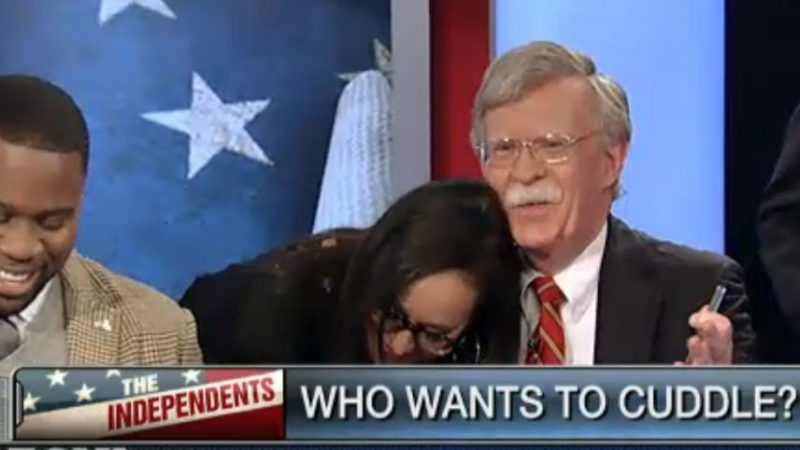My Conversations with John Bolton
Trump's new National Security Adviser is a preemptive warrior, a nonproliferation obsessive, and someone who has described himself as a "hawkish libertarian."

President Donald Trump's announcement last night that he was replacing purported realist H.R. McMaster as his National Security Adviser with pre-emptive war aficionado John Bolton led me down memory lane, and not just to the days when some anti-interventionist naifs believed out loud that "if Trump actually wins the White House, the military-industrial complex is finished."
No, what I'll always remember fondest was this contentious interview Bolton gave about Iraq and George Orwell with me, Kennedy, and Kmele Foster on the late, great Independents:
It takes a certain amount of chutzpah not just to selectively misuse Orwell (similarly to how Bolton and his fellow hawks routinely abuse "Munich" and "appeasement"), but to run such crude argumentation up the flagpole a full decade after the disastrous Iraq War. This intellectual defiance is in sharp contrast to McMaster, who is interested in enough in the deadly costs of foreign policy fabulism that he wrote an entire reputation-making book on the subject: Dereliction of Duty: Johnson, McNamara, the Joint Chiefs of Staff, and the Lies That Led to Vietnam. The Bolton-McMaster swap means less of an in-house brake on Trump coloring outside the lines, and more (along with the Mike Pompeo-for-Rex-Tillerson trade) White House support for the president's campaign-reinforced hostility to the Iran nuclear deal.
Yet, for what it's worth, Bolton has described himself to me (including in public) as basically a "hawkish libertarian." By which he mostly meant on domestic issues, such as government spending (agin'), gay marriage (for), and so on. But there's also a foreign policy overlap between the mustachioed one's cranky hostility toward international institutions and the sovereignty-guarding skeptics on the libertarian right, in the Ron Paul/Thomas Massie tradition. That the United States does not consider itself to be subject to prosecution under the Chemical Weapons Convention is in no small part thanks to John Bolton. He is contemptuous of nation-building, rejects the label "neoconservative," found the U.S. Kosovo bombing "very troubling," has a Public Choice-style critique of the State Department, and speaks fondly of Barry Goldwater—all positions shared by many non-hawks.
But whereas the Pauls and Massies of the world mix their anti-multilateralism with genuine anti-interventionism, Bolton relishes the American role as global cop. He is obsessed with having Washington ensure that weapons of mass destruction do not end up in the hands of bad guys, but is dismissive of most international apparatuses bent toward that goal, and not noticeably concerned with the many grave unintended consequences that can come with unilateral, violent weapons-removal.
He is also someone accustomed to having fruitful dialogue with people who find many of his views abhorrent, as this Matthew Waxman essay in the otherwise Bolton/Trump-averse Lawfare blog makes clear. It is something I have experienced in person—not only did Bolton come on The Independents a dozen times in its 15-month run, but we have bumped into each other in green rooms many times since then, and the conversation is always lively and respectful. There's a reason he gravitated toward smart/funny shows like Kennedy and Red Eye (the latter of which he was "president" of), and that intervention-skeptics like Andy Levy have some fondness for the guy.
big step down for bolton imo pic.twitter.com/VRjiJgp14X
— andy levy (@andylevy) March 22, 2018
Of course, all that and a bucket of spit gets you…a bucket of spit.


Show Comments (30)